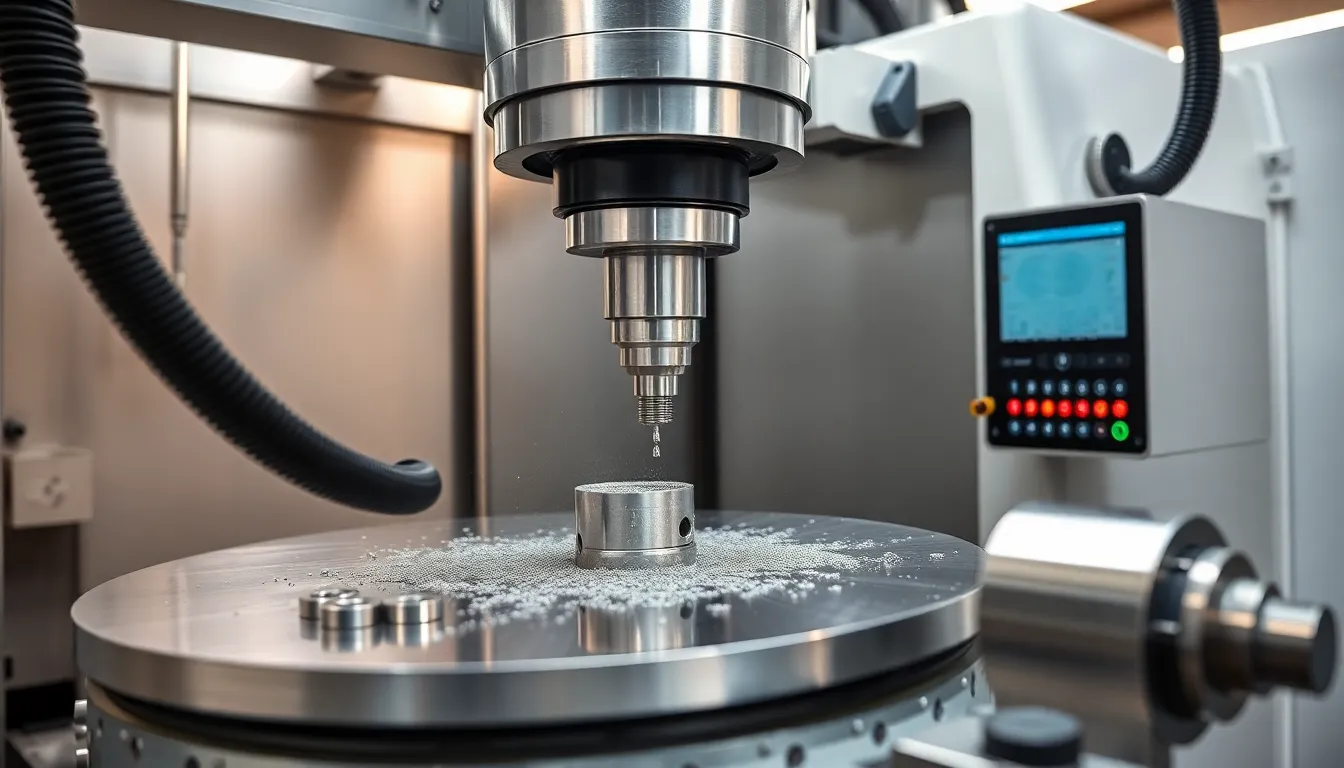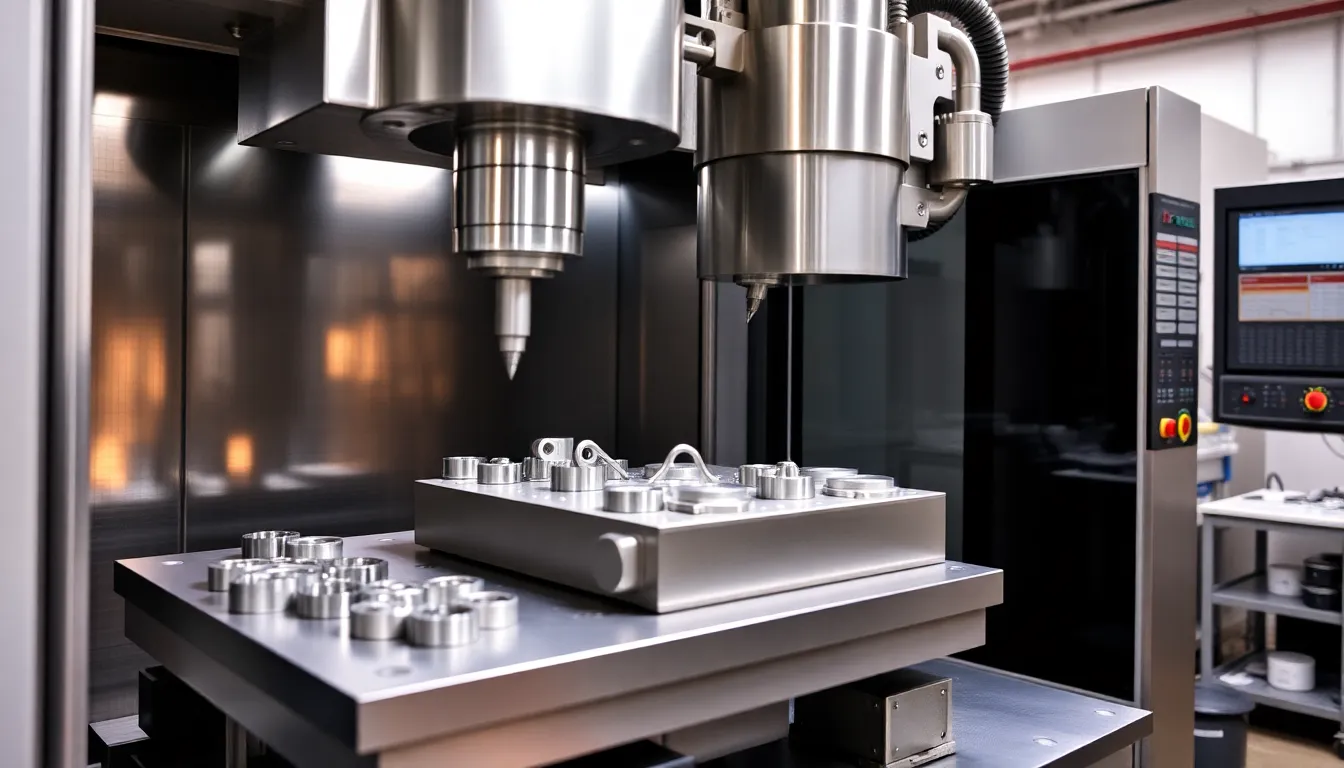Key Takeaways
- CNC stands for Computer Numerical Control, a technology that automates machining processes through computer programs for unmatched precision and consistency.
- CNC machining is widely used across industries like aerospace, automotive, electronics, medical devices, and telecommunications for producing complex, high-tolerance components.
- The technology enables efficient, repeatable production with tolerances as tight as 0.001 inch, drastically reducing manual errors and increasing productivity.
- CNC machines include milling machines, lathes, and turning centers, each optimized for specific manufacturing tasks and materials.
- By leveraging CNC technology, companies such as Yijin Hardware deliver reliable, high-quality parts in both small and large volumes, meeting strict industry standards.
CNC stands for Computer Numerical Control, a technology that automates machining processes through computer programs for unmatched precision and consistency in manufacturing. The technology enables efficient, repeatable production with tolerances as tight as 0.001 inch, drastically reducing manual errors whilst increasing productivity across industries including aerospace, automotive, electronics, medical devices, and telecommunications. CNC machines include milling machines, lathes, and turning centers, each optimized for specific manufacturing tasks, converting digital designs into precise machine movements through programmed G-code instructions. For comprehensive precision manufacturing services leveraging advanced CNC technology, Yijin Hardware provides CNC machining, sheet metal fabrication, die casting, injection molding, and 3D printing solutions, delivering high-quality, precision-engineered products for automotive, aerospace, medical, and energy sectors with capabilities to produce complex components meeting strict industry standards and tight tolerances.
What Does CNC Stand For in Machining?
CNC in machining stands for “Computer Numerical Control.“ This term refers to a manufacturing technology where computers direct machine tools based on programmed code. CNC systems automate tasks like cutting, drilling, and milling by converting digital designs into precise machine movements. Operators input instructions with specific coordinates, speeds, and tool paths; the CNC controller then interprets the data and executes the process.
Manufacturers like Yijin Hardware in Homestead, FL, rely on CNC machining to produce consistent parts for automotive, aerospace, medical, and energy sectors. CNC machines achieve tolerances as tight as 0.001 inch for high-precision components. Services at Yijin Hardware include CNC milling, turning, custom fasteners, and other precision operations. This computer-based control reduces errors and increases production speed compared to manual machining. With CNC, companies can repeat complex designs with accuracy across small or large production runs.
How CNC Technology Works
CNC technology uses computer programs to automate machining tasks, translating digital designs into machine movements with high precision. CNC machining improves accuracy and production speed by replacing manual control with computer-directed operations.
Overview of CNC Machines
CNC machines operate in manufacturing environments by following pre-programmed digital instructions called G-code. These machines include milling machines that cut and shape parts, lathes that rotate material as stationary cutting tools remove sections, and drills used for creating holes. Other types, such as grinders and laser cutters, handle fine material removal and advanced cutting tasks. Industries like automotive, aerospace, medical, and energy sectors prefer CNC machines for their ability to produce complex components with tolerances as tight as 0.001 inch. Yijin Hardware in Homestead, FL, uses CNC machining for small- and large-volume projects, ensuring identical parts are produced consistently.
Key Components of CNC Systems
CNC systems include several critical components. The controller is the computer that receives the coded instructions and issues commands. Motors, such as servo or stepper types, drive the axes according to these commands. The drive system converts motor movements into the precise motion required for different operations. Feedback systems use sensors to confirm tool position and maintain accuracy. Machine tools like milling cutters, drills, or grinders interact directly with the material. Safety enclosures and interlocks protect operators from moving or hot parts, supporting safe operation in workshops like Yijin Hardware’s Homestead facility.
Types of CNC Machines Used in Machining

CNC machines operate under programmed software to enable high-precision manufacturing across critical industries. Yijin Hardware in Homestead, FL employs several CNC machine types to achieve exacting tolerances and efficient part production for clients in the automotive, aerospace, energy, and medical sectors.
CNC Milling Machines
CNC milling machines shape workpieces by moving a rotating cutter along three to five axes. The system’s ability to operate across multiple axes allows machining complex surfaces and tight features in one setup. Yijin Hardware utilizes advanced CNC milling equipment to produce custom hardware, including aerospace brackets, engine components, and medical enclosures. Typical tolerances achieved reach 0.001 inch or closer, supporting projects that require intricate geometries or specialized finishing. Multi-axis capability enables reduced cycle times and minimizes part handling, directly benefitting industries with strict quality demands.
CNC Lathes and Turning Centers
CNC lathes and turning centers fabricate cylindrical and round components by spinning raw material against a stationary tool. Turning centers expand on standard lathe functions by integrating automated tool changers and, in some configurations, live milling heads. Yijin Hardware’s shop includes both single and multi-axis turning centers, enabling production of shafts, valve bodies, bushings, and threaded components common in automotive and energy applications. Tight control over spindle speed and tool movement ensures consistency and repeatability for high-volume production runs. Combined mill-turn machines shorten lead times for custom fasteners and complex assemblies.
Advantages of CNC Machining
CNC machining increases accuracy and reliability for part production by replacing manual control with computer automation. Companies like Yijin Hardware in Homestead, FL use this technology to meet strict standards in industries such as aerospace and medical manufacturing.
Precision and Consistency
CNC machining achieves high-precision results by following computer programs that govern every cut and movement. Measurements reach tolerances as close as 0.001 inch, which is essential for producing intricate parts for aircraft engines and medical devices. Repeating the same digital instructions eliminates dimensional errors and ensures that every unit meets the same specifications. At Yijin Hardware, every component produced meets exacting requirements for automotive and aerospace clients, minimizing waste and scrap from deviations.
Efficiency and Productivity
CNC machining increases productivity by automating manufacturing cycles and running equipment without interruption. Machines process metal, plastic, and other materials 24/7, significantly reducing lead times. Automated workflows speed up both small- and large-batch production, allowing rapid order fulfillment for clients in sectors like energy and medical technology. Factories reduce labor costs and achieve higher throughput since computers manage setups, tool changes, and precision adjustments. Yijin Hardware leverages CNC machining to deliver large volumes of custom hardware on tight deadlines while controlling costs and maintaining consistent quality.
Common Applications of CNC Machining
CNC machining supports high-precision production in aerospace, automotive, electronics, medical device, prototyping, and telecommunications sectors.
- Aerospace sector: Components like turbine blades, brackets, and housings require tolerances as tight as 0.001 inch. Yijin Hardware fabricates aerospace flight hardware to client specifications at its Homestead, FL facility.
- Automotive industry: Engine blocks, transmission parts, and gears benefit from consistent quality. Companies including Yijin Hardware produce these components for both custom and production runs.
- Electronics manufacturing: Device housings and connectors, including PCB enclosures and frames, demand precision. Yijin Hardware’s CNC machining enables intricate detail and repeatability in plastic and metal electronic components.
- Medical device fabrication: Implants, orthopedic tools, and surgical instruments depend on safe, precision machining to comply with health and regulatory standards. Yijin Hardware creates these products with CNC mills and lathes for reliability and traceability.
- Rapid prototyping: Prototypes, fixture assemblies, and testing components get produced quickly, maintaining design accuracy. Yijin Hardware’s CNC systems support short lead times and frequent design changes.
- Telecommunications equipment: Precision parts like brackets, panels, and RF enclosures support network reliability. Yijin Hardware manufactures these elements, ensuring fit and signal integrity.
The table below summarizes typical CNC machining applications across these sectors.
| Sector | CNC Machined Parts | Example Yijin Hardware Services |
|---|---|---|
| Aerospace | Turbine blades, housings, brackets | Structural flight hardware |
| Automotive | Engine blocks, gears, custom chassis | Prototype and production machining |
| Electronics | Device housings, connectors, PCB enclosures | Metal and plastic component machining |
| Medical Devices | Implants, surgical instruments, orthopedic tools | Precision tools and implant creation |
| Prototyping | Rapid prototypes, fixtures, test assemblies | Fast turnaround custom prototypes |
| Telecommunications | RF enclosures, panels, mounting brackets | Custom connector and enclosure machining |
Contact Yijin Hardware at +1 626 263 5841 or [email protected] to learn more about their CNC capabilities for these industries.
About Yijin Hardware
Yijin Hardware, located in Homestead, FL, provides a wide range of precision manufacturing services, including CNC machining, sheet metal fabrication, and custom fasteners.
Led by CEO Gavin Yi, Yijin Hardware also offers additional solutions such as die casting, injection molding, and 3D printing, supporting industries such as automotive, aerospace, medical, and energy. With a commitment to high-quality, precision-engineered products, Yijin Hardware delivers tailored solutions to meet the unique needs of its clients across various sectors.
Contact:
Gavin Yi, CEO
Phone: +1 626 263 5841
Email: [email protected]
Website: www.yijinsolution.com
Location:
760 NW 10th Ave, Homestead, FL 33030
Frequently Asked Questions
What is CNC machining?
CNC machining is a manufacturing process where computers control machine tools to produce precise parts. CNC stands for “Computer Numerical Control“ and uses programmed instructions to automate cutting, drilling, and shaping materials for consistent, high-quality results.
How does CNC technology improve manufacturing?
CNC technology automates the production of parts, which increases speed, accuracy, and repeatability. It reduces human error, allows for complex designs, and ensures every part meets the exact specifications needed for modern industries.
What industries use CNC machining?
CNC machining is widely used in aerospace, automotive, medical device manufacturing, electronics, energy, telecommunications, and for rapid prototyping. Each sector benefits from the technology’s precision and consistency.
What kinds of machines are used in CNC machining?
Common CNC machines include milling machines, lathes, turning centers, drills, grinders, and laser cutters. Each machine type is specialized for tasks like shaping, cutting, or finishing materials with high accuracy.
What are the advantages of CNC machining over traditional methods?
CNC machining offers greater precision, consistency, and speed by automating tasks. It allows for tight tolerances, reduces waste, minimizes human error, and enables efficient production of both small and large runs of complex parts.
How accurate are CNC machines?
CNC machines can achieve very high accuracy, often holding tolerances as tight as 0.001 inch. This level of precision is essential for critical industries like aerospace and medical device manufacturing.
What is G-code in CNC machining?
G-code is a programming language used to control CNC machines. It contains the digital instructions that guide the machine’s movements, tool changes, and operations to produce the desired part.
Are CNC machining processes safe?
Yes, CNC machines are designed with safety features such as emergency stops, enclosures, sensors, and interlocks to protect operators and ensure safe operation in manufacturing environments.
Can CNC machining be used for custom parts and prototypes?
Absolutely. CNC machining is ideal for producing custom parts, prototypes, and short production runs due to its flexibility, speed, and ability to precisely replicate digital designs.
What are common parts made with CNC machining?
Common CNC machined parts include engine components, turbine blades, electronic housings, medical implants, surgical instruments, gears, and telecommunications enclosures. Companies like Yijin Hardware manufacture these for various industries.

